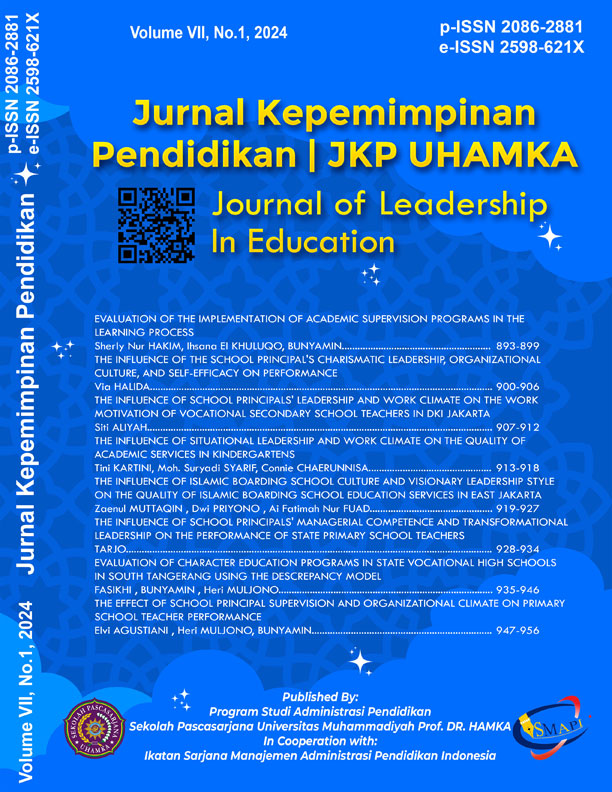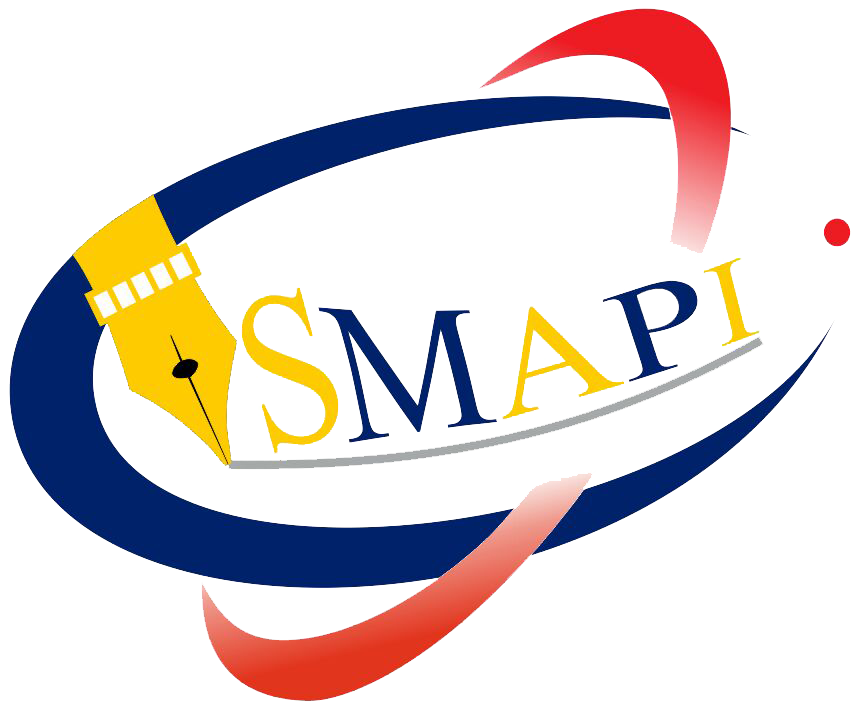EVALUATION OF CHARACTER EDUCATION PROGRAMS IN STATE VOCATIONAL HIGH SCHOOLS IN SOUTH TANGERANG USING THE DESCREPANCY MODEL
Keywords:
Character Education, Descrepancy, Evaluation Model, Field Work Practice, Gaps, Vocational SchoolAbstract
Character education for vocational schools has significant benefits, including making students more independent, responsible as well as a tough personality, never giving up, with a good moral mentality will make students have a good personality and strong resistance to adaptation in the world of work. The purpose of this study is to a) evaluate at the design stage of the character education program, b) evaluate the application (installation) of carrying capacity, c). the implementation process whether it is in accordance with the achievement of program objectives, d).The final result (product) or the main target of the program that has been achieved in the implementation of the program, the cost of the character education program in the Field Work Practice (PKL) program at Vocational High Schools in South Tangerang City, South Tangerang is in accordance with the standards set conduct evaluations on, related to character education using the Descrepancy Evaluation Model (DEM) model according to the stages of Design, Installation, Process, Product and Cost. The research method used is qualitative research by conducting questionnaires, interviews with school management, teachers, students, industry, practitioners, and alumni, as well as field observations in the field. The results of this study show that the design aspect is close to 90% achievement, the installation aspect has 80%-90% achievement, the process aspect has 88% achievement, product 83.82% and cost more than 90%, thus there are gaps at each stage so that comprehensive improvement is needed by exploring and overcoming each criterion that has significant gaps.
Downloads
References
Abbas, A. (2020). Strengthening Character Education in Vocational High School. Novateur Publications, 6(10), 397–402.
Abbas, A., & Marhamah, M. (2021). Penguatan Pendidikan Karakter di Sekolah Menengah Kejuruan. Aksara: Jurnal Ilmu Pendidikan Nonformal, 7(1), 53. https://doi.org/10.37905/aksara.7.1.53-60.2021
Alkin, M. C., & Wingard, J. (1972). Criteria, Evaluation Evaluation, Formative. UCLA Graduate School Education. http://srv1.eulc.edu.eg/eulc_v5/Libraries/Thesis/BrowseThesisPages.aspx?fn=ThesisPicBody&BibID=12811892&TotalNoOfRecord=138&PageNo=6&PageDirection=Next
Arikunto, S., & Jabar, C. S. A. (2018). Evaluasi Program Pendidikan. In Evaluasi Program Pendidikan (p. 228). Bumi Aksara.
Bogdan, R. C., & Sari, B. K. (1982). Wualitative Research for Education: An Introduction to Theory and Methods. In Info Teknik, Volume 9 No. 1, Juli 2008. Allyn and Bacon, Inc.
Creswell, J. W. (2003). Research design (2nd ed.). Sage Publication.
Dantes, N. (2012). Metode Penelitian. Andi Offset. https://doi.org/10.32388/9ctsyy
Darwanto, & Sari, N. (2020). Pengintegrasian Soft Skills pada Setiap Pembelajaran (Sebagai Upaya Menghadapi Tantangan Revolusi Industri 4.0 / Era Disrupsi). Eksponen, 2(Vol. 10 No. 2 (2020): Eksponen: Volume 10 Nomor 2 September 2020), 42–49. https://jurnal.umko.ac.id/index.php/eksponen/article/view/295
El Khuluqo, I. (2017). Early Childhood Entrepreneurship Education: a Brief Description of an Ideal Entrepreneurship Learning for Middle Childhood. IMC 2016 Proceedings, 1(1), 818–827.
Goleman, D. (2016). Kecerdasan Emosional (alih bahasa : T. Hermaya): Vol. VI. Gramedia Pustaka Utama.
Harmoko, N. F. (2019). Kolase Smk Dalam Menyiapkan Sumber Daya Hospitality. 1–128.
Hidayati, A., Barr, F. D., & Sigit, K. N. (2021). Kesesuaian Kompetensi Lulusan SMK dengan Kebutuhan Dunia Usaha dan Industri. Ekuitas: Jurnal Pendidikan Ekonomi, 9(2), 284. https://doi.org/10.23887/ekuitas.v9i2.39508
Husnita, & Suparno. (2020). Pendidikan karakter dan prakerin berpengaruh terhadap kesiapan siswa memasuki dunia kerja. Jurnal Pedagogi Dan Pembelajaran, 3(3).
Ilmianah, N. (2017). Penguatan Pendidikan Karakter Di SMK Dalam Era MEA. Prosiding Seminar Nasional Pendidikan : “Desain Pembelajaran Di Era Asean Economic Community (AEC) Untuk Pendidikan Indonesia Berkemajuan,” 374–387.
Indriaturrahmi, I., & Sudiyatno, S. (2016). Peran Dunia Usaha Dan Dunia Industri Dalam Penyelenggaraan Smk Berbasis Kearifan Lokal Di Kota Mataram. Jurnal Pendidikan Vokasi, 6(2), 162. https://doi.org/10.21831/jpv.v6i2.6277
Iqbal, M. N. M., Pradana, A. H., & Harshinta, K. A. L. (2022). Fleksibilitas Desain Arsitektur Ruang Publik Skala RW. Vitruvian Vol 11 No 2 Februari 2022, 2598–2982.
Jamaluddin, J., Fahliza, W., & Rahmi, A. (2019). Adiwiyata School. 253(Aes 2018), 64–69.
Mariah, S., & Sugandi, M. (2013). Kesenjangan Soft Skills Lulusan SMK dengan Kebutuhan Industri. PPS UNY, 1–26. https://doi.org/10.4135/9781452276199.n287
Miles, M. B., & Huberman, A. M. (2007). Qualitative Data Analysis (terjemahan). UI Press.
Moleong. (2016). Metodologi Penelitian Kualitatif. PT. Remaja Rosdakarya Offset. https://doi.org/10.15294/komunitas.v4i2.2401
Mufidah, D., Sutono, A., Purnamasari, I., & Sulianto, J. (2020). Integrasi Nilai – Nilai Islami Dan Penguatan Pendidikan Karakter.
Munthe, A. P. (2015). Pentingnya Evaluasi Program di Institusi Pendidikan: Sebuah Pengantar, Pengertian, Tujuan dan Manfaat. Scholaria : Jurnal Pendidikan Dan Kebudayaan, 5(2), 1. https://doi.org/10.24246/j.scholaria.2015.v5.i2.p1-14
Musringudin, Gani, A. R. A., & Priyono, D. (2022). Evaluasi Proram Pendidikan. In Media Sains Indonesia (Vol. 6, Issue Maret).
Nantara, D. (2022). Pembentukan Karakter Siswa Melalui Kegiatan di Sekolah dan Peran Guru. Jurnal Pendidikan Tambusai, 6, 2251–2260. https://jptam.org/index.php/jptam/article/view/3267%0Ahttps://jptam.org/index.php/jptam/article/download/3267/2742
Nazir, M. (2013). Metode Penelitian. Ghalia Indonesia.
Nisa, M. I., & Alinurdin. (2023). Model Pembinaan Karakter Disiplin Siswa. 3(1).
Perkasa, R. D. (2022). Buku Daras Kewirausahaan. 1.
Ramdani, A. Y., & Ghina, A. (2016). Identifikasi Karakteristik Wirausahawan Dalam Menghadapi Persaingan. E-Proceeding of Management, 3(3), 3040–3048.
Rusdi, M., Natsir Mahmud, M., Hanafy, M. S., & Yaumi, M. (2017). Pelaksanaan Pendidikan Karakter Di Smk Negeri 4 Makassar. Jurnal Diskursus Islam, 5(3), 527–547. https://doi.org/10.24252/jdi.v5i3.7081
Sandroto, C. W. (2021). Pelatihan: Pentingnya Soft Skill Untuk Kesuksesan Kerja Bagi Siswa-Siswi Sekolah Menengah Kejuruan. Martabe : Jurnal Pengabdian Kepada Masyarakat, 4(1), 298. https://doi.org/10.31604/jpm.v4i1.298-305
Stockmann, R. (2011). An introduction to evaluation. In A Practitioner Handbook on Evaluation. https://doi.org/10.4337/9781849808026.00007
Suardipa, I. P., Widiara, I. K., & Indrawati, N. M. (2021). Urgensi Soft Skill Dalam Perspektif Teori Behavioristik. Edukasi: Jurnal Pendidikan Dasar, 2(1), 63–74. http://stahnmpukuturan.ac.id/jurnal/index.php/edukasi/article/view/1393/1091
Sugiyono. (2012). Metode Penelitian Kuantitatif, Kualitatif, dan R&D. Alfabeta.
Sukardi. (2014). Evaluasi Program Pendidikan Dan Kepelatihan. In (Doctoral dissertation, Driyarkara School of Philosophy). Bumi Aksara.
Suraiya, N., Yusrizal, Majid, M. S. A., & Setiawan, D. (2020). The evaluation model of integrated social sciences learning program. Universal Journal of Educational Research, 8(11B). https://doi.org/10.13189/ujer.2020.082212
Sutjipto. (2019). Perancangan Kurikulum Sekolah Menengah Kejuruan Sebagai Pranata Budaya Kerja. Jurnal Pendidikan Dan Kebudayaan, 4(1), 102–126. https://doi.org/10.24832/jpnk.v4i1.1219
Tsauri, S. (2015). Pendidikan Karakter: Peluang Dalam Membangun Karakter Bangsa. In IAIN Jember Press.
Widiaty, I. (2017). Relevansi Kurikulum Smk Berbasis Industri Kreatif Dengan Metode Extrapolation and the Econometric Approach. Innovation of Vocational Technology Education, 9(1), 29–42. https://doi.org/10.17509/invotec.v9i1.4882
Downloads
Published
How to Cite
Issue
Section
License
Copyright (c) 2024 Fasikhi FASIKHI, Bunyamin BUNYAMIN, Hery MULJONO

This work is licensed under a Creative Commons Attribution 4.0 International License.















